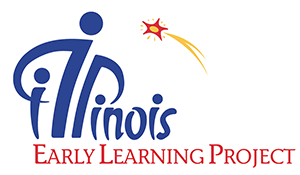Some children start kindergarten with double the vocabulary of others. Knowing many words and understanding them are important in developing thinking skills and in getting ready to read. Here are some ways for busy parents to add to a child’s school readiness with the gift of new words. It’s never too early to start!
Conversation
Find time to talk with your child! Make it a habit to turn off the radio or the “screens” and use those moments for conversation. Talking with adults is the best way to expose a child to new words and ideas.
- When you can, include your child when talking with other adults.
- Set aside a regular time to talk with him—bedtime or mealtime are ideal.
- Rephrase what your child says and build on it, showing you understand. “You’re hot? The sun is warm today, isn’t it? Would you like a cold drink?”
- Pause after speaking to your child, giving him time to respond.
Adaptations for children with significant support needs
- Preverbal children can use alternative communication methods such as pictures, communication devices or sign language.
- Some children have adverse reactions to directives. Challenge yourself to not give directions during play; comment instead. Rather than “Put the block on top like this,” try “Wow! Your tower is getting so tall!”
- Children with a language delay may have a limited vocabulary. Point to things your child might find interesting and talk about what they’re called. For example, if you see a bird outside, direct your child’s attention by pointing to the bird and say, “It’s a bird!” to help build their vocabulary.
- Don’t be discouraged if children don’t make eye contact or join in conversation with you. Follow their lead to learn about their interests. Instead of requiring eye contact, allow your child to interact with you however they are comfortable. Many children are listening even if they aren’t looking at you.
Routines
Build vocabulary during your everyday routines.
- When you shop, talk about what you will buy and how you will use it. Discuss size and weight. Is a package small or large, heavy or light?
- When you’re cooking dinner, discuss what you’re cooking and what foods can be eaten raw. Talk about where foods come from.
- When your child watches TV or videos, watch with her. Talk about what you are watching together, especially if you think the child might have missed some word meanings. Look for children’s programs and videos that teach in fun ways, such as “Sesame Street.”
- Talk about where you’re going and what you see. “Do you think there might be a bird’s nest in that tree?” “Is that building a bank or a hospital?” “How do you know?” “Who do you think might work there?”
- Label objects with your words. “That flower is a rose. Look at the caterpillar.” Learn with your child. “I don’t know what that bug is. Let’s ask the librarian to help us find a book on insects.”
Adaptations for children with significant support needs
- Children may communicate using alternative methods in addition to speech. Use your child’s communication method to communicate with them. For example, if your child uses pictures to communicate, you can use their pictures to comment “red car” when they are playing with a red car or “drink juice” when you are drinking juice. For children who use speech generating devices, try using their device to model commenting on things they might find interesting.
- “Narrate your day” by describing your daily activities and providing rich descriptions. Children who do not communicate with words or other methods yet will still benefit from hearing your narration.


 PDF
PDF